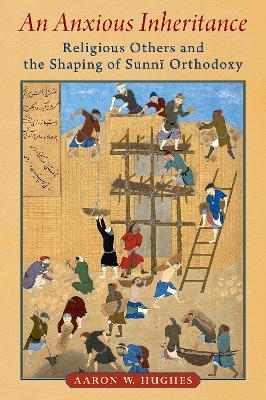
An Anxious Inheritance
Religious Others and the Shaping of Sunni Orthodoxy
Seiten
2022
Oxford University Press Inc (Verlag)
978-0-19-761347-4 (ISBN)
Oxford University Press Inc (Verlag)
978-0-19-761347-4 (ISBN)
An Anxious Inheritance reveals the tensions between the early framers of Islam and the ever-expandable category of non-Muslims. Examining the encounter with these religious others, and showing how the Qur'an functioned as both a script to understand them and a map to classify them, this study traces the key role that these religious others played in what would ultimately emerge as (Sunni) orthodoxy. This orthodoxy would appear to be the natural outgrowth of the Prophet Muhammad's preaching, but it ultimately amounted to little more than a retroactive projection of later ideas onto the earliest period.
Non-Muslims (among them Christians, Jews, Zoroastrians) and the "wrong" kinds of Muslims (e.g., the Shi'a) became integral--by virtue of their perceived stubbornness, infidelity, heresy, or the like--to the understanding of what true religion was not and, just as importantly, what it should be. These non-Muslims were rarely real individuals or groups; rather, they functioned as textual foils that could be conveniently orchestrated, and ultimately controlled, to facilitate Muslim self-definition. Without such religious others proper belief could, quite literally, not be articulated. Shedding new light on the early history of Islam, while also problematizing the binary of orthodoxy/heresy in the study of religion, An Anxious Inheritance makes significant contributions to a number of diverse academic fields.
Non-Muslims (among them Christians, Jews, Zoroastrians) and the "wrong" kinds of Muslims (e.g., the Shi'a) became integral--by virtue of their perceived stubbornness, infidelity, heresy, or the like--to the understanding of what true religion was not and, just as importantly, what it should be. These non-Muslims were rarely real individuals or groups; rather, they functioned as textual foils that could be conveniently orchestrated, and ultimately controlled, to facilitate Muslim self-definition. Without such religious others proper belief could, quite literally, not be articulated. Shedding new light on the early history of Islam, while also problematizing the binary of orthodoxy/heresy in the study of religion, An Anxious Inheritance makes significant contributions to a number of diverse academic fields.
Aaron W. Hughes is the Dean's Professor of the Humanities and the Philip S. Bernstein Professor in the Department of Religion and Classics at the University of Rochester.
Introduction
Part One: Late Antique Fantasies
Chapter One - Qur'anic Others
Chapter Two - Producing Islam through the Production of Religious Others
Chapter Three - Past Perfect: Opening the Jihiliyya's Complex Present
Part Two: Subsequent Constructions
Chapter Four - Good Jew, Bad Jew
Chapter Five - Making Christians
Chapter Six - Shia: The Other Within
Chapter Seven - The Amorphous Zindiq
Conclusions
Bibliography
| Erscheinungsdatum | 08.03.2022 |
|---|---|
| Verlagsort | New York |
| Sprache | englisch |
| Maße | 221 x 150 mm |
| Gewicht | 499 g |
| Themenwelt | Geisteswissenschaften ► Geschichte ► Regional- / Ländergeschichte |
| Geschichte ► Teilgebiete der Geschichte ► Religionsgeschichte | |
| Geisteswissenschaften ► Religion / Theologie ► Islam | |
| ISBN-10 | 0-19-761347-0 / 0197613470 |
| ISBN-13 | 978-0-19-761347-4 / 9780197613474 |
| Zustand | Neuware |
| Haben Sie eine Frage zum Produkt? |
Mehr entdecken
aus dem Bereich
aus dem Bereich
Herkunft, Blüte, Weg nach Osten
Buch | Hardcover (2024)
C.H.Beck (Verlag)
39,00 €
Von den Anfängen bis zur Gegenwart
Buch | Hardcover (2022)
C.H.Beck (Verlag)
34,00 €
warum die Religionen erst im Mittelalter entstanden sind
Buch | Hardcover (2024)
C.H.Beck (Verlag)
38,00 €


